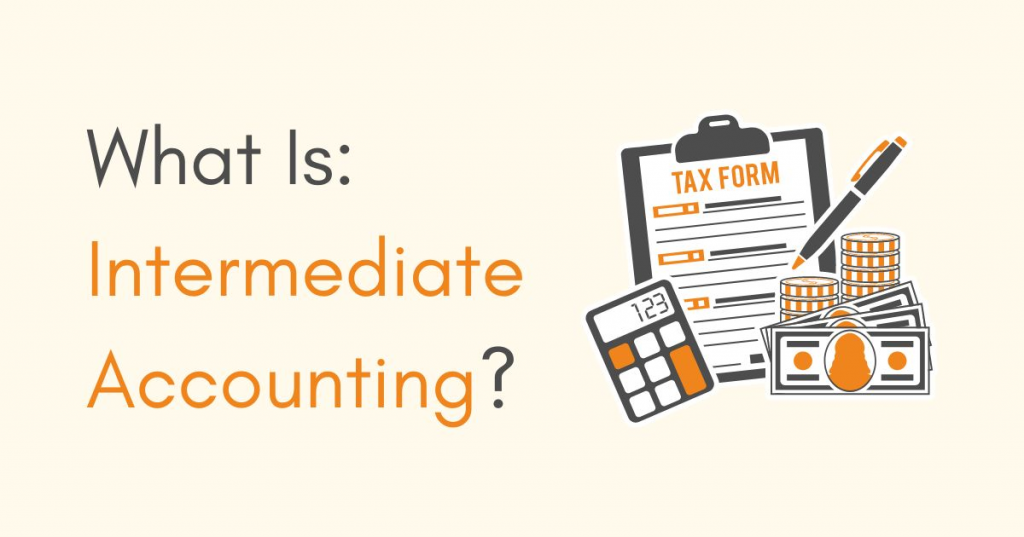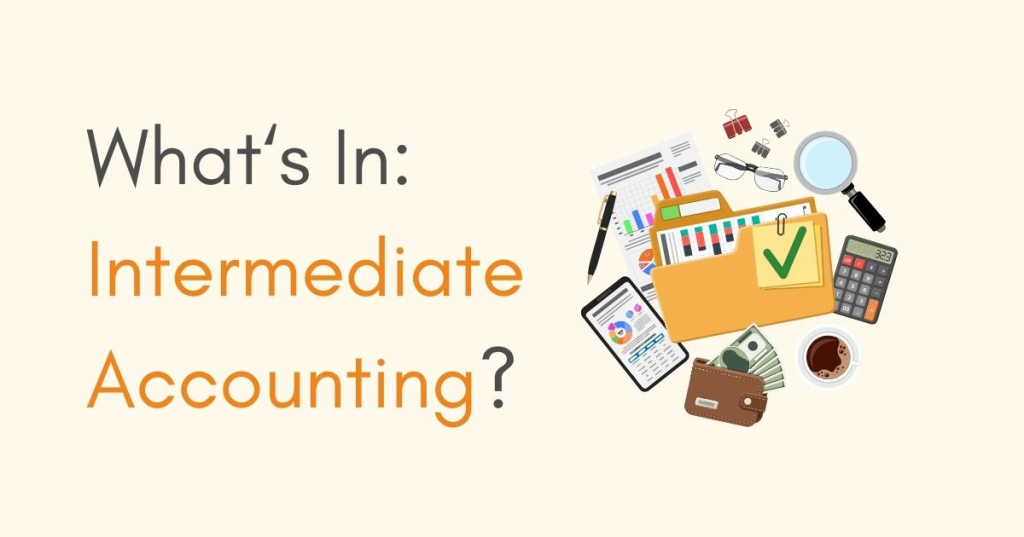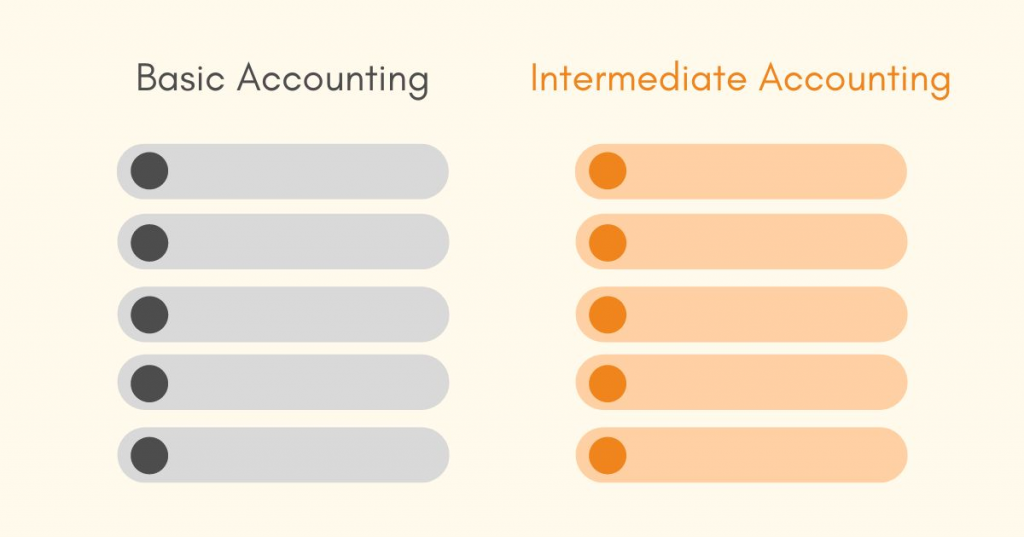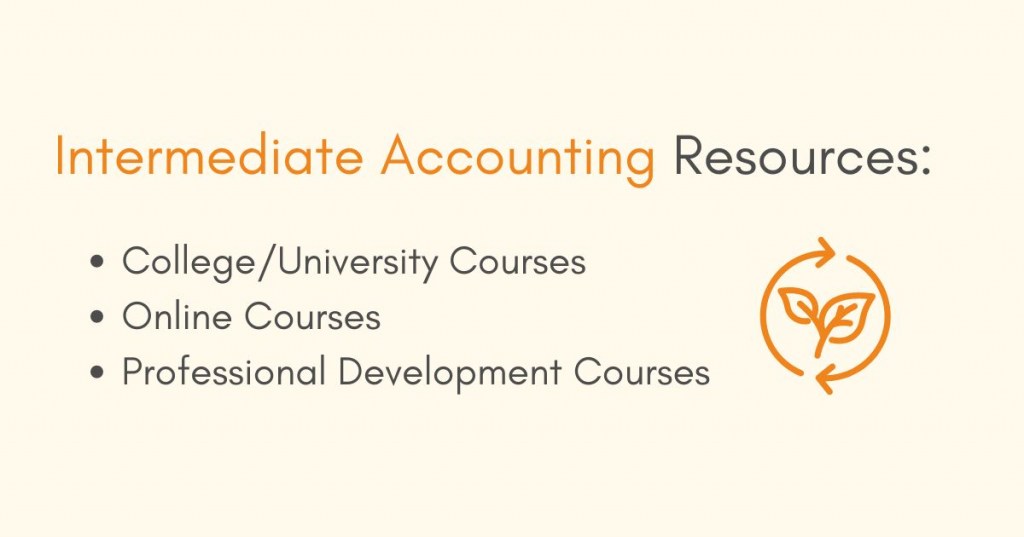Intermediate Accounting: Your Path to a High-Paying Career
If you've got a solid grasp of basic accounting principles, you might be wondering what comes next. That's where intermediate accounting steps in. It's a crucial stepping stone for anyone aspiring to a career in finance, accounting, or business analysis. Let's dive in!
What Is Intermediate Accounting?

Intermediate accounting builds upon the foundational knowledge you gained in basic accounting. It delves deeper into complex accounting concepts and practices used in real-world business scenarios.
This includes an in-depth look at:
Financial statements (beyond just preparation)
Accounting standards (GAAP or IFRS),
And specific accounting topics like long-term assets, liabilities, equity, and more.
Financial Statements
In basic accounting, you learn how to prepare financial statements like the income statement, balance sheet, and cash flow statement. Intermediate accounting goes beyond this mechanical process. It teaches you how to dissect these statements, understand their interconnectedness, and extract meaningful insights about a company's financial health and performance.
You'll learn to calculate and interpret financial ratios, like the debt-to-equity ratio or the return on assets, to gauge a company's profitability, liquidity, and solvency.
You'll explore the concept of the time value of money and how it affects the valuation of assets and liabilities.
You'll learn how to analyze a company's cash flow statement to understand its ability to generate and use cash.
Accounting Standards
Accounting standards, like the Generally Accepted Accounting Principles (GAAP) in the United States or the International Financial Reporting Standards (IFRS) used globally, provide the rules and guidelines for how companies should report their financial information.
In intermediate accounting, you'll delve into the complexities of these standards and learn:
How different methods of accounting for inventory, depreciation, and revenue can impact a company's financial statements.
How to identify and account for complex transactions like stock options, leases, and pensions.
How changes in accounting standards can affect a company's financial reporting and its bottom line.
Specific Accounting Topics
Intermediate accounting covers a wide range of specialized topics that weren't covered in-depth in basic accounting. These topics delve into the nitty-gritty of how companies account for specific assets, liabilities, and equity transactions.
For example, you'll learn:
Long-term assets: How to account for the depreciation of buildings, machinery, and equipment over time.
Intangible assets: How to value and account for assets like patents, copyrights, and trademarks.
Liabilities: How to account for bonds, leases, and other long-term obligations.
Stockholders' equity: How to account for stock issuances, stock repurchases, dividends, and retained earnings.
Intermediate accounting bridges the gap between theory and practice.
What's in Intermediate Accounting?

Intermediate accounting courses offer a deep dive into the financial mechanics that drive businesses. Let's take a closer look at the key areas you'll explore:
Financial Statement Analysis
Financial statements are more than just static documents – they're stories about a company's financial journey. Intermediate accounting equips you with the skills to read between the lines and unlock valuable insights.
Ratio Analysis: You'll learn to calculate and interpret financial ratios like the current ratio (liquidity), debt-to-equity ratio (leverage), and return on equity (profitability). These ratios provide a snapshot of a company's financial health and performance compared to its industry peers.
Trend Analysis: You'll examine financial statements over multiple periods to identify trends in revenue, expenses, and profitability. This helps you assess a company's growth trajectory and potential risks.
Common-Size Analysis: By expressing financial statement items as a percentage of total assets or total revenue, you'll gain a clearer picture of a company's financial structure and cost composition.
Example: Analyzing a company's income statement might reveal a declining gross profit margin, indicating potential pricing pressure or rising costs of goods sold. This information could be crucial for investors or managers making strategic decisions.
Accounting Standards
Accounting standards provide the framework for how companies record, measure, and report their financial information. In intermediate accounting, you'll gain a deep understanding of GAAP (Generally Accepted Accounting Principles) or IFRS (International Financial Reporting Standards):
Revenue Recognition: You'll learn the complex rules governing when and how companies recognize revenue, including multi-element arrangements and long-term contracts.
Inventory Costing: You'll explore various methods for valuing inventory, such as FIFO (first-in, first-out), LIFO (last-in, first-out), and weighted average cost. Each method can have a different impact on a company's reported profits.
Lease Accounting: You'll understand how to classify leases as either operating leases or finance leases, which can significantly affect a company's balance sheet and financial ratios.
Example: A change in accounting standards regarding revenue recognition could require a software company to defer revenue from multi-year subscriptions, potentially impacting its short-term profitability.
Specific Accounting Topics
Intermediate accounting zooms in on specific areas of accounting that have significant implications for financial reporting and decision-making:
Long-term Assets: You'll learn how to account for the depreciation of property, plant, and equipment, as well as the amortization of intangible assets like patents and copyrights.
Liabilities: You'll delve into the accounting for bonds payable, including interest expense calculations and bond discounts or premiums.
Stockholders' Equity: You'll understand the accounting for stock issuances, stock repurchases, dividends, and retained earnings.
Income Taxes: You'll explore how income taxes are calculated and reported, including deferred tax assets and liabilities.
Example: Understanding how to account for the impairment of long-term assets is crucial for assessing a company's financial position accurately.
The Difference: Basic vs. Intermediate Accounting

The following is a comparison table between Basic Accounting and Intermediate Accounting, we also have easy-to-understand accompanying examples:
| Feature | Basic Accounting | Intermediate Accounting | Examples |
| Focus | Fundamental accounting concepts and procedures | Advanced accounting concepts and their application in complex situations | Basic: Recording a simple cash sale. Intermediate: Accounting for a long-term contract with multiple performance obligations. |
| Level of Detail | Overview of topics | In-depth exploration and analysis | Basic: Learning the accounting equation (Assets = Liabilities + Equity). Intermediate: Calculating the present value of a bond using different interest rate scenarios. |
| Financial Statement Emphasis | Preparation and basic interpretation | Detailed analysis and interpretation | Basic: Preparing a basic income statement. Intermediate: Analyzing a company's financial statements to assess its liquidity, profitability, and solvency ratios. |
| Accounting Standards | Introduction to GAAP or IFRS | In-depth understanding and application of GAAP/IFRS | Basic: Learning the basic principles of revenue recognition. Intermediate: Applying revenue recognition rules to complex transactions like bundled software sales. |
| Specific Topics | Basic transactions, simple journal entries | Complex transactions, accounting for estimates and judgments | Basic: Recording depreciation expense on a straight-line basis. Intermediate: Accounting for the impairment of a long-term asset based on its estimated future cash flows. |
| Problem-Solving | Simple problems with clear solutions | Complex problems requiring critical thinking and decision-making | Basic: Calculating the cost of goods sold based on a simple inventory costing method. Intermediate: Determining the appropriate method for valuing inventory in a situation with fluctuating prices and different inventory turnover rates. |
| Target Audience | Beginners, non-accounting majors | Accounting/finance majors, professionals | Basic: Introductory accounting course for business students. Intermediate: Accounting course for students pursuing a degree in accounting or finance, or for professionals seeking to enhance their financial analysis skills. |
| Career Relevance | Essential for understanding basic financial reports | Critical for accounting/finance careers, valuable for decision-makers in any field | Basic: Bookkeeper, accounts payable/receivable clerk. Intermediate: Financial analyst, accountant, auditor, controller, chief financial officer (CFO), or any role that requires in-depth financial analysis and understanding of complex accounting transactions and standards. |
Table: The Difference Between Basic Accounting and Intermediate Accounting by SkillTrans
In essence, basic accounting lays the groundwork, while intermediate accounting elevates your understanding and prepares you for a career in finance or accounting.
Intermediate Accounting Salary
The average salary for intermediate accountants varies depending on factors like location, industry, experience, and certifications.
However, here's a general idea of what you can expect:
Intermediate Accounting Salary in the US
The average base salary for an intermediate accountant in the U.S. ranges from $66,090 to $80,790 per year, with an average of $72,990 (as of June 2024).
Intermediate Accounting Salary in Australia
Intermediate accountants in Australia can earn an average salary of $77,500 per year.
Intermediate Accounting Salary in Canada
Salaries for intermediate accountants in Canada typically range from $60,000 to $80,000 per year.
Intermediate Accounting Resources

Here's a detailed look at the various resources available for those interested in learning intermediate accounting:
College/University Courses
These courses offer a comprehensive and structured approach to learning intermediate accounting, often within the context of a degree program in accounting or finance.
You'll benefit from expert instruction, engaging discussions, and challenging assignments that deepen your understanding.
Pros:
Comprehensive Curriculum: Courses are typically part of a broader accounting or finance program, offering a structured and in-depth exploration of intermediate accounting concepts.
Faculty Expertise: Learn from experienced professors who can guide you through complex topics and provide valuable insights.
Peer Interaction: Engage with fellow students through class discussions, group projects, and networking opportunities.
Academic Credit: Earn college credits that can be applied toward a degree or certification.
Cons:
Time Commitment: Requires dedicated study time and adherence to a set schedule.
Cost: Tuition fees can be substantial.
Limited Flexibility: This may not be ideal for working professionals with busy schedules.
Who Should Consider: Students pursuing accounting or finance degrees, or those who prefer a structured, in-person learning environment.
Online Courses
Learn at your own pace and on your own schedule, making it ideal for busy professionals or those seeking a self-directed learning experience.
Choose from a wide range of courses offered by renowned universities, industry experts, and online learning platforms.
Pros:
Flexibility: Learn at your own pace and on your own schedule, making it a great option for working professionals or those with busy lifestyles.
Variety: Choose from a wide range of courses offered by reputable platforms like Coursera, Udemy, edX, and SkillTrans.
Affordability: Often more cost-effective than traditional college courses.
Interactive Learning: Many online courses offer engaging video lectures, quizzes, assignments, and discussion forums.
Cons:
Less Instructor Interaction: May have limited opportunities for direct interaction with instructors or peers.
Requires Self-Discipline: Success depends on your ability to stay motivated and manage your time effectively.
Varying Quality: Research thoroughly to ensure the course you choose is reputable and meets your learning objectives.
Who Should Consider: Working professionals, self-directed learners, or those seeking a more affordable and flexible option.
Professional Development Courses
Many organizations, including accounting firms and professional associations, offer continuing education courses designed to keep your skills up-to-date and boost your career prospects.
Some courses focus on specific areas of intermediate accounting, such as financial statement analysis, accounting standards, or industry-specific accounting practices.
Pros:
Career Advancement: Enhance your skills and knowledge to advance your career or earn certifications.
Industry-Specific: Many courses are tailored to specific industries, such as healthcare or government accounting.
Networking Opportunities: Connect with other professionals in your field.
Up-to-date Content: Courses often reflect the latest changes in accounting standards and regulations.
Cons:
Cost: Can be expensive, especially for specialized courses.
Limited Availability: May not be offered regularly or in all geographic locations.
Time Commitment: Some courses may require travel or time away from work.
Who Should Consider: Accounting professionals seeking to maintain their certifications, update their skills, or specialize in a particular area.
Additional Resources
Textbooks: A well-regarded intermediate accounting textbook can be an invaluable resource for self-study or supplementing other courses. The following textbooks may serve as general background sources:
Intermediate Accounting, by Kieso, Weygandt, and Warfield, published by John Wiley & Sons, various editions (this is the most commonly adopted textbook at universities)
Intermediate Accounting, by Spiceland, Sepe, Nelson, and Tomassini, published by McGraw-Hill/Irwin, various editions
Professional Organizations: Organizations like the American Institute of Certified Public Accountants (AICPA) offer resources, webinars, and conferences on intermediate accounting topics.
Mentorship: Seek out experienced accountants who can provide guidance and support as you learn and grow in your career.
No matter which path you choose, taking the initiative to master intermediate accounting is a wise investment in your professional future. It opens doors to exciting career opportunities and equips you with the skills to navigate the complex world of finance.
Conclusion
Intermediate accounting is a challenging yet rewarding subject. Mastering it equips you with valuable skills for understanding financial information, analyzing business performance, and making strategic decisions. Whether you're aiming for a career in accounting or simply want to enhance your financial literacy, this is an essential area of knowledge.
Ready to take your accounting knowledge to the next level? Browse SkillTrans' courses on intermediate accounting to strengthen your understanding of financial reporting and analysis.

Meet Hoang Duyen, an experienced SEO Specialist with a proven track record in driving organic growth and boosting online visibility. She has honed her skills in keyword research, on-page optimization, and technical SEO. Her expertise lies in crafting data-driven strategies that not only improve search engine rankings but also deliver tangible results for businesses.



